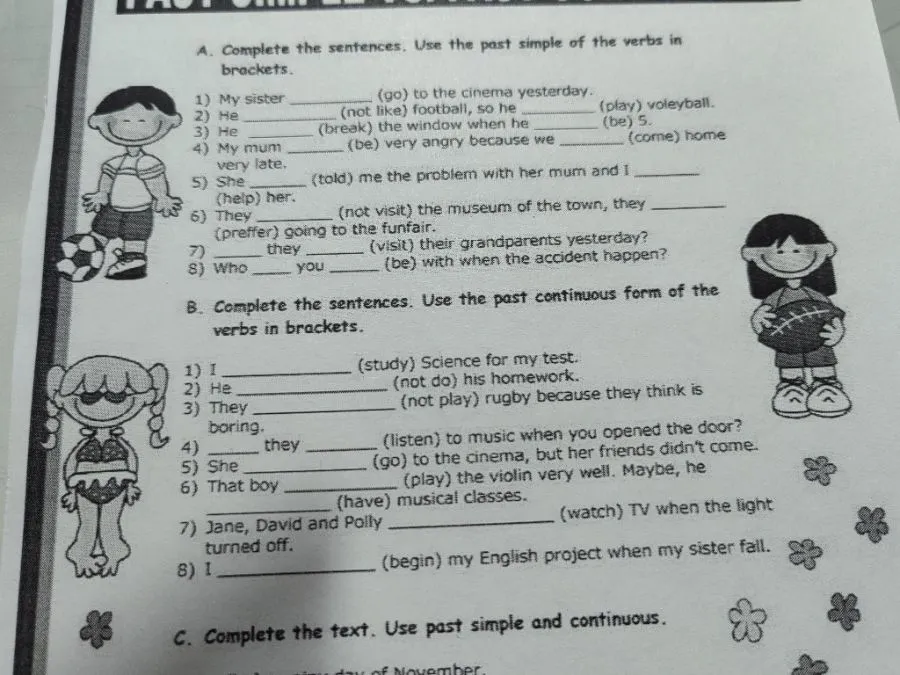My Content
Account
Catalog
System
App & Social
Our Projects
×
![]()

In this exercise, we need to use the Past Simple tense of the verbs given in brackets. The Past Simple is used to talk about completed actions in the past.
1) My sister went (go) to the cinema yesterday.
- Go is an irregular verb, and its past form is went.
2) He didn't like (not like) football, so he played (play) volleyball.
- For negative forms in Past Simple, we use didn't + base form of the verb.
- Play is a regular verb, so we add -ed.
3) He broke (break) the window when he was (be) 5.
- Break is irregular (break → broke).
- Be is irregular (be → was/were). We use was for he/she/it.
4) My mum was (be) very angry because we came (come) home very late.
- Be → was for singular subjects like "my mum".
- Come is irregular (come → came).
5) She told (tell) me the problem with her mum and I helped (help) her.
- Tell is irregular (tell → told).
- Help is regular, so we add -ed.
6) They didn't visit (not visit) the museum of the town, they preferred (prefer) going to the funfair.
- Negative form: didn't + base form (visit).
- Prefer is regular, so we add -ed.
7) Did they visit (visit) their grandparents yesterday?
- For questions in Past Simple, we use Did + subject + base form of the verb.
8) Who were you with (be with) when the accident happen?
- Be is irregular (be → was/were). We use were for you.
- Note: This is a special case where the auxiliary verb comes before the subject in a question with "who".
In this exercise, we need to use the Past Continuous tense of the verbs given in brackets. The Past Continuous is used to describe actions that were in progress at a specific time in the past.
1) I was studying (study) Science for my test.
- Was (for I) + studying (present participle of study)
2) He wasn't doing (not do) his homework.
- Negative form: wasn't (for he) + doing (present participle of do)
3) They weren't playing (not play) rugby because they think is boring.
- Negative form: weren't (for they) + playing (present participle of play)
4) Were they listening (listen) to music when you opened the door?
- Question form: Were (for they) + subject + listening (present participle of listen)
5) She was going (go) to the cinema, but her friends didn't come.
- Was (for she) + going (present participle of go)
6) That boy was playing (play) the violin very well. Maybe, he was having (have) musical classes.
- Was (for that boy) + playing (present participle of play)
- Was (for he) + having (present participle of have)
7) Jane, David and Polly were watching (watch) TV when the light turned off.
- Were (for multiple subjects) + watching (present participle of watch)
8) I was beginning (begin) my English project when my sister fell.
- Was (for I) + beginning (present participle of begin)
For this exercise, we need to understand when to use each tense:
Example: I visited my grandmother yesterday.
Past Continuous: Used for actions that were in progress at a specific time in the past
Example: I was reading when she called.
Common pattern: Past Continuous + when + Past Simple
Since the actual text for Exercise C is not fully visible in the image, I can't provide the specific answers, but you can apply these rules to complete it correctly.


Use Homiwork as a regular app. It's convenient!
Add to Home ScreenUse Homiwork as a regular app. It's convenient! Open your Safari menu and tap 'Add to Home Screen'.


By starting to use the service, you accept: Terms of Service, Privacy Policy, Refund Policy
